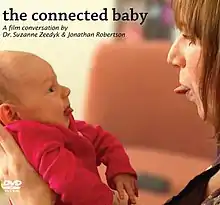The Connected Baby
The Connected Baby (stylized as the connected baby) is a 2011 documentary film produced by Dr Suzanne Zeedyk, a developmental psychologist based at the University of Dundee, Scotland. The film-maker was Jonathan Robertson. The film had its premiere on 25 July 2011 at the Dundee Contemporary Arts centre in Scotland.[1] Funded by the British Psychological Society, the film explores research showing that infants are born with active social abilities, already able to communicate and connect emotionally with others.[2] This view of infants contrasts with traditional claims that they are born as passive ‘blank canvases’, who acquire communicative capacities as they develop.[3]
| the connected baby | |
|---|---|
 DVD cover | |
| Narrated by | Dr Suzanne Zeedyk |
| Music by |
|
Release date |
|
Running time | 75 mins |
| Country | United Kingdom |
| Language | English |
Synopsis
The film provides visual footage of contemporary research findings that babies are born with innate social abilities and are able to engage in emotional exchanges by responding to other people's body rhythms and vocal tones and movements. It features footage of parents, grandparents, and siblings interacting with infants, as well as commentary from infant researchers in the United Kingdom.
Chapters
Each of these chapters analyses a specific interaction between the baby and another person, during which the baby's communicative abilities are illuminated. A trailer of the film is publicly available.[4]
- "the dance of connection",
- "the dance of the nappy",
- "the dance of the air",
- "the dance of the mirror"
History
In 2011, the film featured as one of the Renfrewshire-based events in the Scottish Mental Health Arts & Film Festival [5] and also received showings in New York [6] and Albuquerque, USA.[7] In 2012, showings were held at events based within the Scottish Parliament [8] and the Northern Irish Assembly at Stormont.[9] The film also toured venues in Northumberland, England in July 2012,[10] as organized by the local governmental authority. All of these events grew out of a desire by associated organisations to highlight the scientific links that have been established between early life experiences and later life outcomes, in domains such as health, education, imprisonment, and sustaining relationships.[11] The film has since been cited in academic publications.[12]
References
- Inglis, Marjory (23 June 2011). "Born social — new film explores babies' ability to communicate". The Courier.
- Macleod, Fiona (24 June 2011). "Babies born with ability to communicate". The Scotsman (subscription required). Archived from the original on 23 March 2015. Retrieved 21 September 2014.
- "Babies use subtle movements and signs to communicate". The Sunday Herald (subscription required). 26 June 2011. Archived from the original on 23 March 2015. Retrieved 21 September 2014.
- "Watch Film Trailer".
- "Scottish Mental Health Arts & Film Festival".
- "Screening of the connected baby - Museum of Motherhood. Nov 2011".
- "Generation Justice. Speaking with Dr. Suzanne Zeedyk".
- "The human desire for connected communities".
- "Northern Ireland Assembly – Health Inequalities Review: Institute of Public Health in Ireland".
- "Newsletter for Northumberland Families and Children's Trust".
- "Adverse Childhood Experiences Study - Linking childhood trauma to long-term health and social consequences".
- Chown, Alison (2014). Play Therapy in the Outdoors. Jessica Kingsley Publishers. p. 94. ISBN 9780857008053.